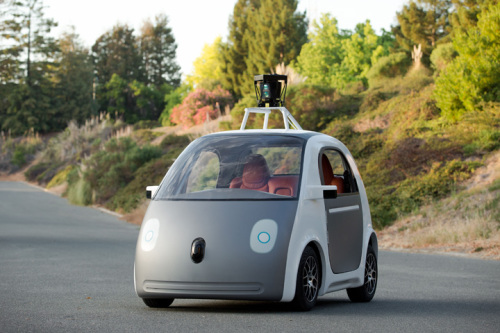The future of the car: from the fuels they’ll run on, to the materials they’ll be made of, to the computers that may drive them.

This undated image provided by Google, shows an early version of Google’s prototype self-driving car. For the first time, California’s Department of Motor Vehicles knows how many self-driving cars are traveling on the state’s public roads. The agency is issuing permits, Tuesday, Sept. 16, 2014 that let three companies test 29 vehicles on highways and in neighborhoods. (AP)
In the year 2025, cars and the rules of the road could look a whole lot different. Cars that drive themselves. Run on hydrogen. Made out of futuristic materials. That know your musical preferences. Favorite places to shop and eat. And get this: They’ll even sense if you’re having a heart attack. Companies are dreaming up and road testing the next generation of automobiles. And not too far down the road, today’s gas-guzzling, road clogging, unreliable cars could be left behind in the rear view mirror. This hour On Point: Driving ambitions and the future of cars.
– Jane Clayson
Guests
Eddie Alterman, editor in chief at Car and Driver Magazine.
Eric Tingwall, technical editor at Car and Drive Magazine. (@EricTingwall)
Robin Chase, founder and former CEO of Zipcar. Founder and CEO of Buzzcar. (@rmchase)
From The Reading List
The Economist: Wireless wheels — “Just as regulation has helped increase fuel efficiency, cut exhaust fumes and introduce anti-skid equipment, so government involvement is needed to get the connected car on the road. It is beginning to happen. Earlier this year, Europe’s standards-setting agencies agreed a common set of protocols for cars and traffic infrastructure to communicate. Others should follow. Governments should then set firm deadlines for all new cars to be fully connected and capable of platooning, and a date for existing cars to be retrofitted with a basic locator beacon and the ability to receive hazard warnings.”
Forbes: With The Auto Industry Facing A Dead End, Google Turns The Corner (Driver Not Required) — “Google, for its part, has chosen to focus on delivering the whole package. Because the company doesn’t have to deliver a car today, it can skip the phase where it offers a partly self-driving car and can focus on the ultimate goal of a dispatchable robotic taxi that can upend the auto industry as we know it and fulfill Adam Jonas’ vision. To do that, it will have to put those truly driverless cars on the roads in plain sight for the world to see.”
CNN: Future of driving – “Fully self-driving cars remain some years away. But new technology in the next five to 10 years will help cars park themselves, monitor the alertness of the driver and even communicate with each other to avoid collisions. Tomorrow’s cars may have long-range headlights, external airbags and hydrogen fuel-cell engines that emit only water.”







